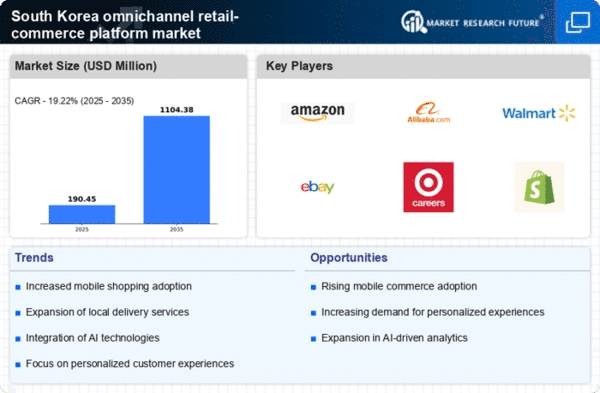Rising E-commerce Adoption
The omnichannel retail-commerce-platform market in South Korea experiences a notable surge in e-commerce adoption, driven by increasing internet penetration and smartphone usage. As of 2025, approximately 95% of the population has access to the internet, facilitating seamless online shopping experiences. This trend indicates a shift in consumer behavior, where shoppers prefer the convenience of online platforms while still valuing in-store experiences. The integration of various sales channels allows retailers to cater to diverse consumer preferences, enhancing overall customer satisfaction. Furthermore, the e-commerce sector in South Korea is projected to reach a market value of $100 billion by 2026, underscoring the potential growth opportunities within the omnichannel retail-commerce-platform market. Retailers are thus compelled to adopt innovative strategies to remain competitive in this evolving landscape.
Consumer Demand for Personalization
In the omnichannel retail-commerce-platform market, there is a growing consumer demand for personalized shopping experiences. South Korean consumers increasingly expect tailored recommendations and customized services that cater to their individual preferences. This trend is reflected in the fact that 70% of consumers are more likely to engage with brands that offer personalized experiences. Retailers are leveraging data analytics and artificial intelligence to gather insights into consumer behavior, enabling them to deliver targeted marketing campaigns and product suggestions. As personalization becomes a key differentiator, businesses that effectively implement these strategies are likely to enhance customer loyalty and drive sales. The omnichannel retail-commerce-platform market must adapt to this demand, ensuring that consumers receive a cohesive and personalized experience across all channels.
Shift Towards Sustainable Practices
The omnichannel retail-commerce-platform market is witnessing a shift towards sustainable practices, driven by increasing consumer awareness regarding environmental issues. South Korean consumers are becoming more conscious of their purchasing decisions, with 60% indicating a preference for brands that prioritize sustainability. Retailers are responding by adopting eco-friendly packaging, reducing waste, and sourcing products responsibly. This trend not only aligns with consumer values but also enhances brand reputation and loyalty. As sustainability becomes a core component of business strategy, companies in the omnichannel retail-commerce-platform market are likely to invest in sustainable technologies and practices. This shift may lead to a competitive advantage, as consumers increasingly favor brands that demonstrate a commitment to environmental stewardship.
Technological Advancements in Retail
Technological advancements play a crucial role in shaping the omnichannel retail-commerce-platform market in South Korea. Innovations such as augmented reality (AR) and virtual reality (VR) are transforming the way consumers interact with products. Retailers are increasingly adopting these technologies to create immersive shopping experiences that bridge the gap between online and offline channels. For instance, AR applications allow customers to visualize products in their own environment before making a purchase. Additionally, the implementation of advanced payment solutions, such as mobile wallets and contactless payments, enhances the convenience of transactions. As technology continues to evolve, the omnichannel retail-commerce-platform market is likely to witness further integration of these innovations, ultimately improving customer engagement and satisfaction.
Integration of Logistics and Supply Chain Solutions
Integrating logistics and supply chain solutions is a critical driver for the omnichannel retail-commerce-platform market in South Korea. Efficient logistics operations are essential for meeting the demands of consumers who expect fast and reliable delivery services. As of 2025, the logistics market in South Korea is projected to grow by 8% annually, highlighting the importance of robust supply chain management. Retailers are increasingly investing in advanced logistics technologies, such as real-time tracking and automated warehousing, to streamline operations and enhance customer satisfaction. This integration allows for better inventory management and faster fulfillment processes, ultimately improving the overall shopping experience. As competition intensifies, the ability to provide efficient logistics solutions will likely become a key differentiator in the omnichannel retail-commerce-platform market.
















